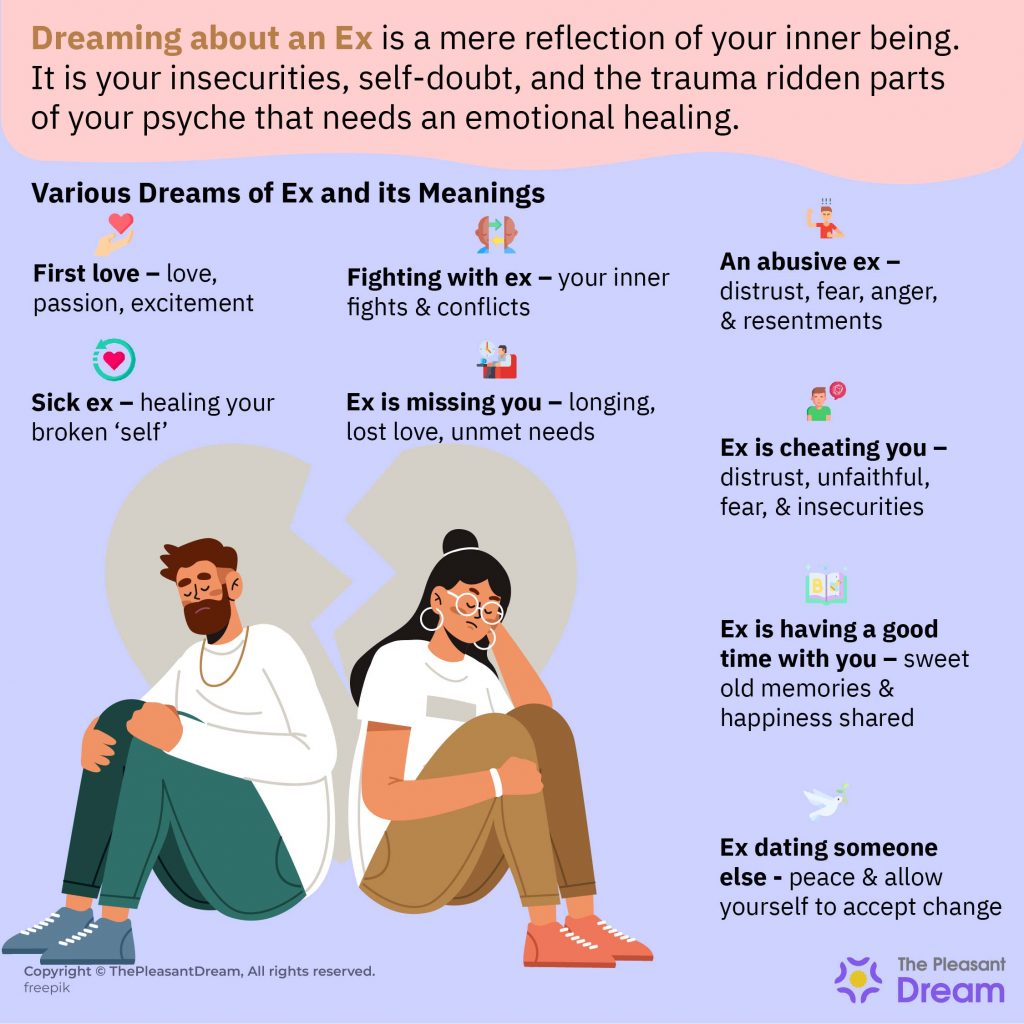It's quite common, you know, to hear someone talk about an "ex." This little word, just two letters long, carries a whole lot of meaning, especially when we think about past connections. Whether it's an old school friend, a former colleague, or perhaps, as we're talking about here, someone's "ex novias de Facundo," the term really does pop up a lot. It's a quick way to point to a relationship that once was, a bond that has changed its shape.
People often use "ex" to describe a person who was once a significant part of their life, someone they had a close relationship with. It's a handy shorthand, a linguistic shortcut that lets us quickly get across the idea of a previous bond without needing to say a lot more. The way we use it, it almost seems like everyone understands what you mean right away, which is pretty useful.
So, we're going to take a closer look at this word, "ex," and how it functions in our everyday conversations. We will check out where it comes from, what it means in different situations, and how it helps us talk about things that happened before. It's a simple word, yet it holds a lot of history and purpose, particularly when we consider its role in describing people like "ex novias de Facundo."
- Really Hairy Lesbians
- Terrance Howard Mayne
- Scott Galloway On The View Today
- Madeline Brincos Dieras
- Look At Ayton Of Deandre
Table of Contents
- The Story of 'Ex' - A Word's Past Life
- What Does 'Ex' Really Mean When We Talk About Ex Novias de Facundo?
- The Many Faces of 'Ex' - Beyond Ex Novias de Facundo
- Is 'Ex' Always Needed, Even for Ex Novias de Facundo?
- How Does Language Shift Affect Our Talk About Ex Novias de Facundo?
- Can We Use 'Ex' in a Sentence About Ex Novias de Facundo?
- The Sound of 'Ex' - A Linguistic Quirk for Ex Novias de Facundo?
- Why Does 'Ex' Remain a Go-To Term for Ex Novias de Facundo?
The Story of 'Ex' - A Word's Past Life
The word "ex" has a rather interesting background, you know, and its story helps us grasp why it means what it does today. It's not just a casual term we use; it has roots that go back quite a ways. For instance, sometimes "ex" is a short way of saying a Latin phrase, like "exempli gratia," which means "for example." That's a pretty common sight in writing when you want to show an instance of something. So, that's one way this little word gets used, almost like a signal to give an illustration.
Then there's its use as a prefix, which is probably how most people think about it. When you see "ex" at the start of a word, it often means something that used to be. For example, in legal talk, there's a phrase, "ex post facto." This phrase points to something done or decided after the fact, a bit like looking back at an event and then making a rule about it. The word "post facto" by itself already means "after the fact," so some might wonder if "ex" is truly needed there. But, you see, it's often part of a set phrase, so it usually stays put.
The dictionary tells us that "ex" can mean someone who once held a particular standing or spot. It can also point to a past partner in a close relationship, like a former husband or wife, or someone you used to be with in a romantic way. This definition is pretty central to how we think about "ex novias de Facundo," for instance. It shows that the word is about a prior connection, a link that has now changed. The way language develops, it seems, has kept this meaning quite clear for us over time.
- Novia De Axel Martinez
- Professor Cal Face
- Is Bangchan In A Relationship 2024
- Yo Bob Fye
- Bashid Mclean And Tanya Bird
| Aspect | Description |
|---|---|
| Term | 'Ex' |
| Primary Meaning (as a noun) | A former partner in a close, personal relationship. This would certainly include someone who was an "ex novia." |
| Origin (as a prefix) | Comes from Latin. It often means "out of" or "former." |
| Usage Examples | Seen in phrases like "ex post facto" (after the fact), "ex dividend" (without the right to a dividend), or "ex warehouse" (from the warehouse, with charges paid up to that point). |
| Common Association | Strongly linked to past connections, especially personal ones. So, it's really about things that were. |
| Linguistic Context | Can be an abbreviation for Latin phrases, or it can stand alone as a short form for an English word referring to a former partner. |
What Does 'Ex' Really Mean When We Talk About Ex Novias de Facundo?
When people talk about "ex novias de Facundo," what they really mean by "ex" is quite simple, in a way. It points to someone who used to be a girlfriend, someone who had a romantic tie to Facundo in the past. The word "ex" here is a neat way to say that the relationship, the connection, is no longer what it once was. It signifies a previous state or a former link, which is pretty much the main idea behind it.
My text tells us that someone's "ex" is a person who was their wife, husband, or partner in earlier times. It's the person they used to be married to or used to have a romantic or sexual relationship with. So, when we use it for "ex novias de Facundo," we are talking about a woman who was, at some point, Facundo's girlfriend. It's a clear marker for a past intimate bond, which is quite useful for conversations.
This definition holds true whether we're talking about a formal marriage or a less formal partnership. The key is that the relationship existed, and now it has changed. So, you know, it's a word that helps us put a label on a prior connection, making it easier to talk about people who were once close but are now no longer in that same kind of relationship. It's a bit like saying "former," but in a shorter, more direct way, which is why it's so popular.
The Many Faces of 'Ex' - Beyond Ex Novias de Facundo
While we often hear "ex" used for past partners, like "ex novias de Facundo," the word itself has a broader range of uses. It pops up in different situations, carrying a similar core idea of something being "out of" or "from" a certain place or state. For instance, in the world of money and business, you might hear about a stock price that is "ex dividend." This means the price doesn't include the right to the next dividend payment, so it's "without" that particular benefit, almost like it has moved out of that state.
Another example from the business side of things is when goods are "bought ex warehouse." This means the goods are free of any costs for moving or handling them before they leave the storage place. So, the buyer takes on those costs from the moment the items are picked up from the warehouse. Here, "ex" means "from" or "out of" that specific location, showing a clear point where responsibilities shift. It's a pretty practical use for the word, you see.
Beyond these, "ex" is also a part of many common English words that imply moving out or away from something. Think about words like "exclude," which means to keep someone out; "exhale," to breathe out; "exit," to go out; "export," to send goods out of a country; or "extract," to pull something out. In all these cases, "ex" points to a movement away from or a removal from something. It's a versatile little part of our language, helping to shape the meanings of many different words, far beyond just talking about "ex novias de Facundo."
Is 'Ex' Always Needed, Even for Ex Novias de Facundo?
It's a fair question to ask if "ex" is always necessary, especially when we consider phrases like "ex novias de Facundo." Sometimes, a word can seem a bit extra, you know, as if the meaning would still be clear without it. For example, my text brings up the legal phrase "ex post facto." The part "post facto" already means "after the fact." So, some might wonder if adding "ex" to it is truly needed, as "after the fact" seems like it would be enough on its own. It's a point about precision in language, really.
However, in many cases, "ex" adds a specific nuance or is part of a widely accepted phrase. Even if "post facto" means "after the fact," the full phrase "ex post facto" has a very particular legal weight and history. It's almost always used together, so changing it might make it sound strange or less formal in that context. This shows how language can have set ways of doing things, even if a part of a phrase might seem a little bit redundant on its own. It's just how some things are said.
When we talk about "ex novias de Facundo," the "ex" part is pretty important because it clearly tells us that these are *former* girlfriends. While you could say "Facundo's former girlfriends," "ex novias" is shorter and very widely understood. It's a common way to talk about past romantic relationships, and it gets the idea across quickly. So, while sometimes a word might seem like it could be left out, often it serves a purpose, either by being part of a fixed phrase or by offering a concise way to share an idea, you know.
How Does Language Shift Affect Our Talk About Ex Novias de Facundo?
Language is always changing, and how we talk about things, including "ex novias de Facundo," can reflect these shifts. My text mentions how the way people speak, especially in America over a long period, can sometimes lead to less precise word choices. It talks about a "dilution of precision in vocabulary," along with changes in spelling and grammar. This means that words that once had very distinct meanings might start to be used more broadly, or perhaps some specific nuances get lost over time. It's a natural part of how language evolves, really.
Consider the difference between "expect" and "anticipate," which my text also brings up. While both relate to looking forward, "anticipate" often carries the idea of preparing for something, not just waiting for it. If people start using them interchangeably, some of that fine distinction might fade. This kind of shift can happen with many words, and it shapes how we express ourselves. It's a gradual process, but it does happen.
So, when we use "ex" to describe "ex novias de Facundo," it's a term that has stayed quite clear in its meaning of "former partner." However, the general trend of language becoming less precise in some areas means we might sometimes see other ways of saying "former girlfriend" that are less direct or more roundabout. But, you know, "ex" has held its ground as a clear and widely understood term for past romantic connections. It shows that while some words might lose their sharp edges, others remain quite firm in their core meaning, which is pretty interesting.
Can We Use 'Ex' in a Sentence About Ex Novias de Facundo?
Yes, we can definitely use "ex" in sentences, and it works quite well when talking about "ex novias de Facundo." The word "ex" functions as a noun in this context, standing in for "former partner." My text provides an example: "Her ex is still sending her flowers, even though." This shows how "ex" can be the main subject of a sentence, or a key part of it, which is pretty straightforward.
So, if we were to talk about Facundo, we might say something like, "One of Facundo's ex novias moved to another city last year." Here, "ex novias" acts as the group of former partners. Or, you could hear, "Facundo saw an ex novia at the market the other day." In this sentence, "an ex novia" points to one specific former girlfriend. It's a very common and accepted way to talk about these past relationships, you know.
The word "ex" makes it easy to refer to someone who was once in a romantic relationship without needing a longer phrase. It's a quick and simple way to convey that important piece of information. The Oxford Advanced Learner's Dictionary, as my text notes, gives a clear meaning, pronunciation, and examples of how to use "ex" as a noun. This shows just how well-established this usage is in our language. So, yes, using "ex" in sentences about "ex novias de Facundo" is not only possible but also quite natural for most people.
The Sound of 'Ex' - A Linguistic Quirk for Ex Novias de Facundo?
It might seem a bit odd to connect the sound of a snore to the word "ex," but there's a small point in my text that talks about how sounds can be simplified in writing. It mentions that in American comics, the sound of a snore can be shown as just a single letter "z" in a speech bubble. This is a very simple way to represent a complex sound, you know, a sort of shorthand for something that's much bigger. It's a linguistic quirk, really, how we reduce things down.
In a similar, though much more abstract, way, the word "ex" itself simplifies a lot of meaning. When we say "ex novias de Facundo," we are using a very short word to stand for a whole past relationship, with all its history and feelings. Just like "z" stands for a snore, "ex" stands for a former partner. It's a kind of linguistic reduction, taking a complex idea and giving it a quick, easy-to-use label. This isn't about sounds being the same, but about the way language finds compact ways to share big ideas.
This reduction is part of what makes language efficient. We don't always need to spell out every detail when a simple word can do the job. So, while the sound of "ex" doesn't directly relate to a snore, the idea of simplifying complex concepts into brief forms is a shared trait. It's a testament to how our language adapts, finding quick ways to convey meaning, whether it's the sound of someone sleeping or the status of someone's "ex novias de Facundo." It's quite interesting how that works, you see.
Why Does 'Ex' Remain a Go-To Term for Ex Novias de Facundo?
Even with language always changing and sometimes becoming less precise, the word "ex" has really stuck around as the main way to talk about former partners, like "ex novias de Facundo." One big reason is its clarity. When someone says "my ex," there's very little confusion about what they mean. It immediately points to a person who was once in a close, romantic relationship with them, which is pretty useful for quick conversations.
It's also incredibly short and easy to say. Just two letters, but they carry a lot of weight. Compare that to saying "my former romantic partner" or "the person I used to be married to." While those phrases are perfectly fine, "ex" is just so much more efficient. This efficiency makes it a go-to choice in everyday talk, you know, because people like to get their point across without using too many words.
The consistent use of "ex" over time has also made it deeply ingrained in our common language. Everyone understands it, which makes it a powerful tool for communication. So, despite any shifts in how people use other words or how precise language might be in different areas, "ex" has held its ground. It's a simple, direct, and universally understood term for a past intimate connection, which is why it continues to be the preferred way to refer to people like "ex novias de Facundo."



Detail Author:
- Name : Dr. Glen Feil
- Username : madyson.torphy
- Email : hahn.dominique@terry.com
- Birthdate : 2005-08-07
- Address : 868 Kohler Fall New Alecchester, AK 70767
- Phone : (820) 624-0638
- Company : Steuber, Abernathy and Stokes
- Job : Baker
- Bio : Nulla non maxime consequatur nostrum quibusdam quasi voluptas. Ut voluptatem nemo id et labore est. Sit ex soluta doloremque harum sit quas dolores. Consequatur laborum et mollitia.
Socials
facebook:
- url : https://facebook.com/joesph_ziemann
- username : joesph_ziemann
- bio : Aliquid reprehenderit laboriosam nesciunt excepturi non est odio.
- followers : 5388
- following : 1256
tiktok:
- url : https://tiktok.com/@ziemannj
- username : ziemannj
- bio : At odio culpa dolorem qui.
- followers : 5169
- following : 2539
instagram:
- url : https://instagram.com/jziemann
- username : jziemann
- bio : Et voluptas mollitia sapiente ut sunt iusto. Laudantium magni repudiandae earum rerum.
- followers : 5009
- following : 930